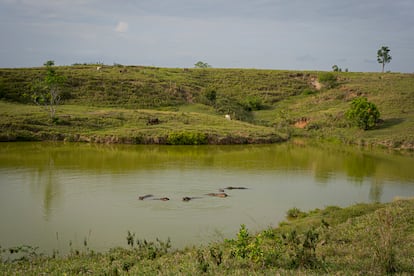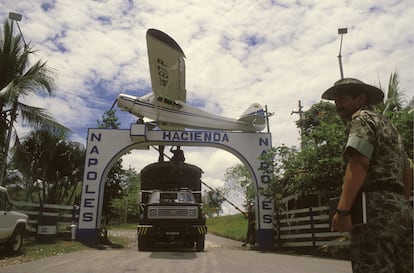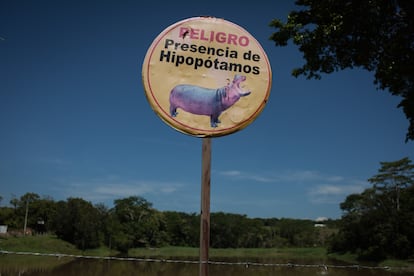Contraception or cull: Pablo Escobar’s hippos await their fate
The four animals the drug lord brought to Colombia illegally in the 1980s have bred uncontrollably, and now pose a threat to the local ecosystem. The authorities are considering drastic action


On the streets of Doradal, in Colombia’s Antioquia department, there are no statues of Simón Bolívar, religious figures or Spanish conquistadors. Monuments are instead erected to hippos. These are found in restaurants, souvenir stores and on posters to attract visitors. “We have internalized that the hippopotamus is here with us,” says Mauricio Garcés, the local councilor for tourism. No one knows exactly how many there are, but estimates put their number close to a hundred. All are descended from the four brought to the country by the drug trafficker Pablo Escobar in the 1980s. At the height of his success, the most famous drug lord in history built himself a private zoo with more than 1,000 species illegally imported from all over the world. The hippopotamuses have survived him, but are now threatening the local ecosystem. What to do with them has become a matter of state.
Mauricio Garcés likes to say that there is no other place in the world outside Africa where a herd of hippopotamuses lives as they do in Doradal, which is 240 kilometers from Bogotá, the capital of Colombia. The community has integrated the animals into their lives, and no one wants to hear about their possible removal. “They cross the streets, like a dog might do, to get to a lake they like,” explains Garcés. The hippopotamus is the third largest land animal and can weigh up to three tons. On October 31, one of them attacked a man and caused him serious injuries. Colombia’s state environmental conservation entity Cornare issued a statement asking people to stay away from these “extremely dangerous” animals. Garcés replies by telephone that the community has never seen them as “enemies,” and has never suffered any attack or aggression, save for an “isolated incident” of someone bothering them.
The animals’ presence became a topic of conversation in Colombia when Pepe the hippo was killed – the first of the herd to suffer this fate. In the summer of 2009, the hippo population hovered around 30, but they were already breeding in the wild in the Magdalena Medio region. The government issued a permit allowing them to be hunted. Pepe was killed by two Germans, accompanied by the army. The photograph of the group with the dead hippo, proudly showing off their trophy kill, shook the country. It reminded some of another photo: the one taken of Escobar’s last moments, pursued and shot on a rooftop in Medellín.

The only thing everyone agrees is that the hippos’ presence is a problem for the native ecosystem. A scientific study published in the journal Biological Conservation in January claimed that by 2034 the hippopotamus population in Colombia could exceed 1,400. What scientists consider the “success” of their adaptation is due to plentiful food in the Magdalena River, combined with the lack of predators or human threats that they usually face in their African habitat. The study calls for immediate action to avoid a “colonization” of the northern part of Colombia, with serious repercussions. It alludes to a cull as the most feasible control measure.
Lawyer Luis Domingo Gómez considers that madness. “As a society, we want to leave behind the whole legacy of violence of Pablo Escobar, in which everything is solved with plata o plomo [literally silver or lead; a reference to money or a bullet]. Since the hippopotamuses don’t have money, they will get lead,” he says. Gómez believes that the animals should be removed from the area, but warns against drastic measures that could end up being “an embarrassment” for Colombia. “The hippos are yet more victims of Pablo Escobar,” he adds.

It is difficult to know why the hippos stayed on Escobar’s property after his death in 1993. The Hacienda Nápoles estate was Escobar’s oasis, a mansion with swimming pools, an airstrip and a bullring – a symbol of all his eccentricities. It was where he signed agreements with the most powerful drug clans in the Americas and held crazy parties. Upon his death, the space passed into the hands of the state. Many animals were transferred to other zoos, but the hippopotamuses remained, expanding their territory over time. Today, Hacienda Nápoles is a theme park where a herd of about 40 animals lives. Others roam the banks of the Magdalena River, occupying an area of about 2,000 square kilometers.
Gómez, the lawyer, lent the cause an international dimension after placing it in the hands of the Colombian justice system. He hopes to demonstrate that there are alternatives to slaughter, proposing a drug to control the birth rate of the animals with the help of a US animal welfare association. The case has already reached the United States, where a judge in Ohio admitted the arguments of two animal experts in favor of birth control for the hippopotamuses. This will have to be taken into account when the case advances in Colombia. The US judge also considered the animals as “persons of interest” in the process, setting a precedent in American jurisprudence.

Meanwhile, Cornare, the Colombian agency, has kept pushing for more drastic action. Last October, a pilot project was launched for the chemical castration of the hippopotamuses living at Hacienda Nápoles. With the help of the US, 24 hippos were neutered. “We are going to follow up to see how successful it could be,” explains David Echeverri López, the coordinator of the Forests and Biodiversity Group of Cornare.
While the measure is being tested, new offspring continue to be born in Colombia’s rivers, at a faster clip than they would in Africa, according to scientists. Three decades after his death, Escobar’s legacy in Colombia continues to weigh in at hundreds of tons.
Tu suscripción se está usando en otro dispositivo
¿Quieres añadir otro usuario a tu suscripción?
Si continúas leyendo en este dispositivo, no se podrá leer en el otro.
FlechaTu suscripción se está usando en otro dispositivo y solo puedes acceder a EL PAÍS desde un dispositivo a la vez.
Si quieres compartir tu cuenta, cambia tu suscripción a la modalidad Premium, así podrás añadir otro usuario. Cada uno accederá con su propia cuenta de email, lo que os permitirá personalizar vuestra experiencia en EL PAÍS.
¿Tienes una suscripción de empresa? Accede aquí para contratar más cuentas.
En el caso de no saber quién está usando tu cuenta, te recomendamos cambiar tu contraseña aquí.
Si decides continuar compartiendo tu cuenta, este mensaje se mostrará en tu dispositivo y en el de la otra persona que está usando tu cuenta de forma indefinida, afectando a tu experiencia de lectura. Puedes consultar aquí los términos y condiciones de la suscripción digital.








































